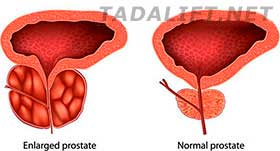Benign Prostatic Hyperplasia affects millions of men worldwide, particularly those over the age of 50. This non-cancerous enlargement of the prostate gland causes various urinary symptoms that can significantly impact quality of life. This article examines Benign Prostatic Hyperplasia, its symptoms, causes, and the different treatment options available to manage this condition effectively.
Benign Prostatic Hyperplasia, also known as benign prostatic hypertrophy, is a common condition characterized by the enlargement of the prostate gland. Unlike prostate cancer, Benign Prostatic Hyperplasia is not malignant and does not increase the risk of developing prostate cancer.
The prostate gland surrounds the urethra, the tube that carries urine from the bladder out of the body. As the prostate enlarges, it can squeeze or partially block the urethra, causing urinary symptoms that can range from mildly annoying to severely debilitating.
Symptoms of Benign Prostatic Hyperplasia
The symptoms of benign prostatic hyperplasia typically develop gradually over time. Many men might not notice the initial changes until the condition has progressed significantly. The severity of symptoms varies widely among individuals. It doesn’t necessarily correlate with the size of the prostate. Some men with only slightly enlarged prostates may experience severe symptoms, while others with significant prostatomegaly (enlarged prostate) may have minimal symptoms.
Primary Benign Prostatic Hyperplasia Symptoms
The most common symptoms of benign prostatic hyperplasia include:
- Frequent urination: Especially at night (nocturia)
- Urgent need to urinate: Sudden, compelling urges that are difficult to postpone
- Difficulty starting urination: Needing to strain or push to begin
- Weak urine stream: Reduced force of urination
- Interrupted urine flow: Stream that starts and stops multiple times
- Dribbling at the end of urination: Inability to completely empty the bladder
- Sensation of incomplete bladder emptying: Sentiments that urine remains even after urinating
Advanced Benign Prostatic Hyperplasia Symptoms
If left untreated, Benign Prostatic Hyperplasia can progress to cause more serious symptoms such as:
- Urinary retention: Complete inability to urinate, requiring emergency catheterization
- Urinary tract infections: Recurring infections due to incomplete bladder emptying
- Bladder stones: Formed from minerals in retained urine
- Kidney damage: From prolonged pressure caused by urine backup
Blood in urine (hematuria): Though less common, it can occur in advanced cases
What Causes Prostate Enlargement?
The exact cause of benign prostatic hyperplasia isn’t fully understood, but researchers have identified several factors that likely contribute to this condition:
Age-Related Hormonal Changes
The primary factor in the development of prostatic hyperplasia appears to be age-related hormonal changes. As men age, the balance of hormones in their bodies changes, particularly the relative amounts of testosterone and estrogen. These hormonal shifts may trigger prostate growth.
Dihydrotestosterone (DHT)
DHT, a hormone derived from testosterone, plays a crucial role in prostate enlargement. Men who have had their testicles removed at a young age (before puberty) don’t develop Benign Prostatic Hyperplasia, and men who have genetic deficiencies in DHT production also don’t develop the condition.
Growth Factors
Various growth factors produced in the prostate tissue may stimulate cell proliferation, leading to hyperplasia (an abnormal increase in the number of cells).
Family History
Having a family history of Benign Prostatic Hyperplasia increases your risk, suggesting a genetic component to the condition.
Lifestyle Factors
Some evidence suggests that obesity, diabetes, and lack of physical activity may increase the risk of developing symptoms of Benign Prostatic Hyperplasia or worsen existing symptoms.
Diagnosis of Benign Prostatic Hyperplasia
If you’re experiencing urinary symptoms, consulting with a healthcare provider is essential. A urologist—a doctor specializing in urinary tract conditions—can diagnose Benign Prostatic Hyperplasia through various methods:
Medical History and Symptom Assessment
Your doctor will ask detailed questions about your urinary symptoms, their severity, how long you’ve had them, and how they affect your daily life. They may use standardized questionnaires like the International Prostate Symptom Score (IPSS) to quantify symptom severity.
Physical Examination
A digital rectal examination (DRE) allows the doctor to feel the size and condition of the prostate. During this brief examination, the doctor inserts a gloved, lubricated finger into the rectum to assess the prostate’s size, shape, and consistency.
Laboratory Tests
Several tests may be performed, including:
- Urinalysis: To check for signs of infection or other conditions
- PSA (prostate-specific antigen) blood test: While primarily used to screen for prostate cancer, elevated PSA levels can also indicate Benign Prostatic Hyperplasia
- Creatinine and BUN (blood urea nitrogen): To assess kidney function and determine if Benign Prostatic Hyperplasia has affected the kidneys
Specialized Tests
For more complex cases, your urologist might recommend:
- Uroflowmetry: Measures urine flow rate and volume
- Post-void residual measurement: Determines if the bladder empties completely
- Urodynamic studies: Evaluates Blood pressure and flow during filling and emptying
- Cystoscopy: Allows visual examination of the urethra and bladder using a small camera
- Transrectal ultrasound: Provides images of the prostate to determine its size more accurately
The diagnostic process helps determine the severity of benign prostatic hyperplasia and advises treatment decisions. Benign prostatic hyperplasia is typically classified in medical records using the ICD-10 code N40.0 (benign prostatic hyperplasia with urinary obstruction).
Treatment Options for Benign Prostatic Hyperplasia
The treatment approach for benign prostatic hyperplasia depends on several factors, including symptom severity, prostate size, age, overall health, and personal preference. Options range from watchful waiting to medications to surgical interventions.
Watchful Waiting
Watchful waiting may be appropriate for men with mild symptoms that don’t significantly affect quality of life. This involves:
- Regular monitoring of symptoms
- Annual prostate examinations
- Lifestyle modifications
- Avoiding medications that can worsen symptoms (like decongestants and certain antihistamines)
Lifestyle Modifications
Simple changes that may help manage mild Benign Prostatic Hyperplasia symptoms include:
- Limiting fluid intake in the evening
- Reducing consumption of alcohol and caffeine
- Double voiding (urinating, waiting a few moments, then trying again)
- Avoiding medications that can worsen symptoms
- Scheduled bathroom trips rather than waiting for the urge
Medications for Benign Prostatic Hyperplasia
Several classes of medications can effectively treat Benign Prostatic Hyperplasia symptoms:
Alpha Blockers
Alpha blockers relax the smooth muscles in the prostate and bladder neck, making urination easier. They typically work quickly, often within days. Common alpha blockers include:
- Tamsulosin (Flomax)
- Alfuzosin (Uroxatral)
- Doxazosin (Cardura)
- Terazosin (Hytrin)
- Silodosin (Rapaflo)
Side effects may include dizziness, headache, and retrograde ejaculation.
5-Alpha Reductase Inhibitors
These medications actually shrink the prostate by preventing the conversion of testosterone to DHT. They include:
- Finasteride (Proscar)
- Dutasteride (Avodart)
Phosphodiesterase-5 Inhibitors
Tadalafil (Cialis), originally developed for erectile dysfunction, has been approved for treating Benign Prostatic Hyperplasia symptoms. It relaxes smooth muscles in the lower urinary tract, improving urine flow.
Combination Therapy
For men with larger prostates and moderate to severe symptoms, combining an alpha blocker with a 5-alpha reductase inhibitor often provides better symptom relief than either medication alone.
Minimally Invasive Therapies
When medications aren’t effective or cause intolerable side effects, several minimally invasive procedures can provide relief:
Transurethral Microwave Thermotherapy (TUMT)
Uses microwave energy to destroy excess prostate tissue, delivered through a catheter inserted into the urethra.
Transurethral Needle Ablation (TUNA)
Uses low-level radiofrequency energy delivered through needles to heat and destroy prostate tissue.
Water Vapor Thermal Therapy
Delivers water vapor (steam) through the urethra to destroy excess prostate tissue.
Prostatic Urethral Lift (UroLift)
Involves placing small implants that pull back the prostate tissue, enlarging the urethra without cutting or removing tissue.
Rezūm Water Vapor Therapy
Uses the natural energy stored in water vapor to remove excess prostate tissue that is pressing on the urethra.
Surgical Treatments
Surgery is typically reserved for men with severe symptoms, those who haven’t responded to other treatments, or those with complications such as recurrent urinary tract infections, bladder stones, or kidney problems.
Transurethral Resection of the Prostate (TURP)
The standard surgical treatment for Benign Prostatic Hyperplasia, TURP, involves removing portions of the prostate tissue through an instrument inserted into the urethra. Though effective, it carries risks including bleeding, retrograde ejaculation, and erectile dysfunction.
Laser Therapies
Several laser procedures can vaporize or remove excess prostate tissue:
- Holmium Laser Enucleation of the Prostate (HoLEP): Removes large pieces of prostate tissue
- Photoselective Vaporization of the Prostate (PVP): Uses a high-powered laser to vaporize tissue
- Thulium Laser Enucleation of the Prostate (ThuLEP): Similar to HoLEP but uses a different type of laser
Benign Prostatic Hyperplasia Treatment

The best treatment approach depends on several factors:
- Symptom severity: Mild symptoms may only require lifestyle changes, while severe symptoms might necessitate more aggressive treatment
- Prostate size: Extremely large prostates may respond better to certain treatments
- Age and overall health: Younger men might opt for more definitive treatments, while older men with other health issues might choose less invasive options
- Personal preferences: Some men may prefer to avoid surgery, while others want a definitive solution
- Existing conditions: Certain health issues may make some treatments more appropriate than others
Living With BPH
For many men, Benign Prostatic Hyperplasia becomes a long-term condition that requires ongoing management. Regular follow-up with a urologist is important to monitor symptoms and adjust treatment as needed.
Self-care measures that can help manage Benign Prostatic Hyperplasia include:
- Staying physically active
- Maintaining a healthy weight
- Eating a balanced diet rich in fruits, vegetables, and whole grains
- Limiting caffeine and alcohol
- Avoiding fluid intake several hours before bedtime
- Managing stress, which can worsen urinary symptoms
- Taking prescribed medications as directed
Frequently Asked Questions
Can Benign Prostatic Hyperplasia lead to prostate cancer?
No, Benign Prostatic Hyperplasia does not increase the risk of developing prostate cancer. They are two separate conditions that can coexist but are not causally related. However, because both conditions can cause similar symptoms, it’s important to get a proper diagnosis.
Is Benign Prostatic Hyperplasia a normal part of aging?
While Benign Prostatic Hyperplasia is extremely common in aging men, it’s not inevitable. Some men never develop significant prostate enlargement or symptoms, even at advanced ages.
Can lifestyle changes prevent Benign Prostatic Hyperplasia?
There’s no guaranteed way to prevent Benign Prostatic Hyperplasia, but staying physically active, maintaining a healthy weight, and eating a healthy diet may reduce your risk or help manage symptoms.
Does Benign Prostatic Hyperplasia cause all urinary problems in older men?
No. While Benign Prostatic Hyperplasia is a common cause of urinary symptoms in older men, other conditions like urinary tract infections, prostatitis, prostate cancer, neurological disorders, or bladder problems can cause similar symptoms. This is why proper diagnosis is essential.
Can Benign Prostatic Hyperplasia be cured completely?
Surgical treatments can provide a long-term solution for many men, effectively removing the obstructing tissue. However, in some cases, tissue can regrow over time. Medications manage symptoms but typically don’t cure the underlying condition.
How quickly will I notice improvement with Benign Prostatic Hyperplasia treatments?
Alpha blockers typically provide symptom relief within days, while 5-alpha reductase inhibitors may take 3-6 months to show maximum benefit. Surgical and minimally invasive procedures often provide immediate improvement in urinary flow, though complete healing may take several weeks.
Will Benign Prostatic Hyperplasia treatment affect my sexual function?
Some treatments, particularly certain medications and surgeries, can affect sexual function. Possible effects include retrograde ejaculation (dry orgasm), decreased libido, or erectile dysfunction. Discuss these potential side effects with your doctor when considering treatment options.
Can an enlarged prostate heal on its own?
Benign Prostatic Hyperplasia does not typically resolve without treatment. However, symptoms may fluctuate in severity over time, sometimes improving temporarily without intervention.

